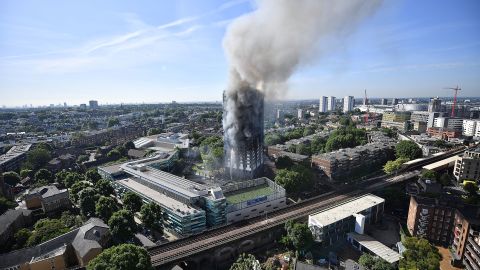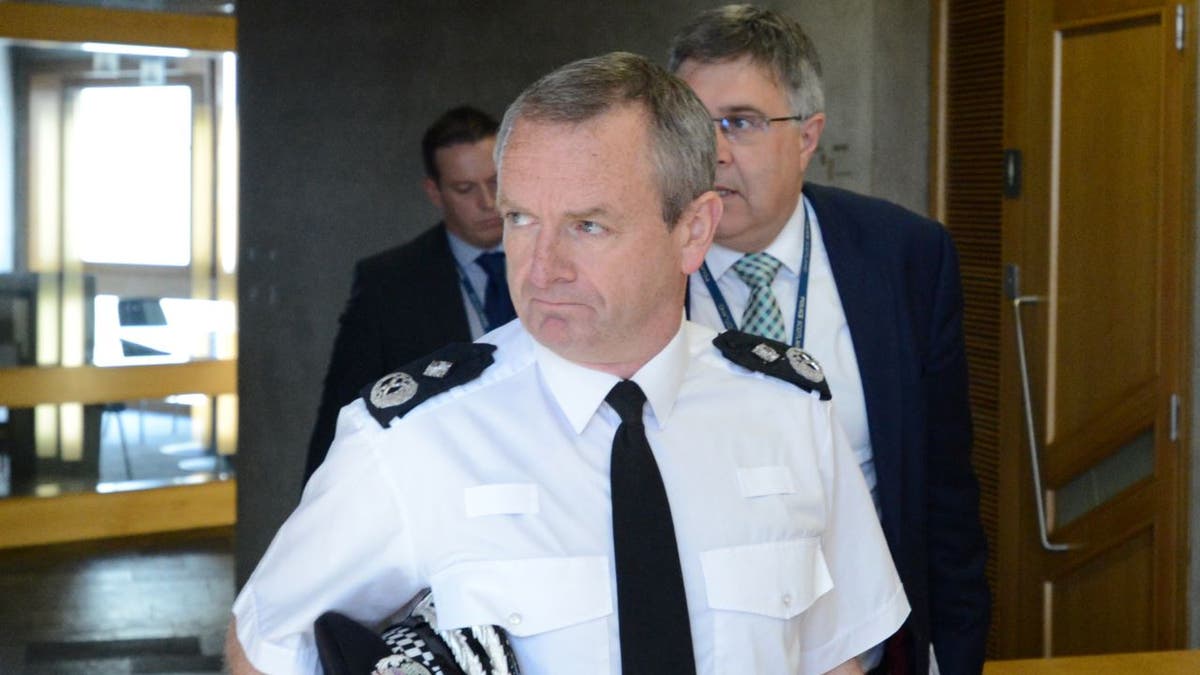London
CNN
—
In May 2017, Sophie Bichener did what many in their twenties are unable to do: buy a home. She paid around £230,000 (around $295,000 at the time) for her two-bedroom apartment in a high-rise building in a town north of London, where a train could get her to work in the capital in less than half an hour. She had her foot on the first rung of Britain’s housing ladder, an increasingly difficult feat, and it felt like the only way was up.
A month later, Bichener woke up to news that would change her life. A fire had broken out at a similar block to hers: the 24-story Grenfell Tower in west London, which was encased in flammable cladding. The material meant to keep out the wind and rain went up like a matchstick. The fire killed 72 people and left an entire community homeless and heartbroken. The ordeal sent Bichener into a panic. Was her building also at risk, she wondered?
The burned remains of Grenfell stood uncovered for months, looming over one of London’s richest boroughs. It became a monument that to many symbolized the disastrous effects of austerity – the decade-long policy of cost-cutting embarked on by the Conservatives in response to the financial crisis of 2008. The tragedy was made all the more stark by its surroundings: the public housing block is just a five-minute walk from Kensington properties worth tens of millions of pounds. Look one way: scarcely imaginable wealth. The other: a hulking symbol of a broken and divided Britain.
In the wake of the fire, there was a wave of promises from politicians that things would change – that building safety would be improved, social housing reformed, and that responsibility would be taken for the government agenda of public spending cuts, deregulation and privatization that acted as kindling for the tragedy that unfolded.
But in the five years since, Britons living in tower blocks with unsafe cladding have found themselves stuck in a perpetual state of limbo. CNN spoke with 10 people, who all say they are paralyzed by fear that their buildings could catch fire at any moment, and crippled by costs thrust upon them to fix safety defects that were not their fault – despite the government promising they would not have to “pay a penny.”
Now, their problems are compounded by a fresh disaster: a spiraling cost-of-living crisis. As energy prices and inflation soar, residents like Bichener are facing an impossible situation, burdened not only by sky-high bills but also the eye-watering expense of remediating properties that now feel more like prisons than homes.
Residents told CNN they were living in a perpetual state of anxiety, inundated by text alerts informing them of mounting bills and waiting on tenterhooks for the next buzz of their phone. Some said their building insurance had quadrupled since they moved in, while others were burdened by ballooning service charges – hundreds of pounds a month for safety fixes that hadn’t been started.
Many said they had left their mortgages on variable rates in the hopes they could eventually sell their apartments, but after the Bank of England hiked interest rates this fall their repayments had become untenable, with monthly payments almost doubling in some cases. Paired with the rising costs of living – more expensive energy, fuel and food – the residents CNN spoke with said they are finding themselves several thousand pounds a year poorer.
When Bichener bought her flat in Vista Tower in Stevenage, a 16-story office block built in 1965 and converted into residential housing in 2016, there was “no mention” of fire hazards, she said. “When Grenfell happened we spoke to our local council just to double-check all the buildings in the town. We asked the management agent and freeholder [the owner of the apartment building and land] if they have any concerns. At that point, everyone was saying no, all these buildings are good,” Bichener told CNN.
But there were soon signs of trouble. The developer that built the block put itself into liquidation – the first “red flag,” Bichener said. Emails to the freeholder went unanswered – the second. Then confirmation: In 2019, two years after Grenfell, the management agent reported that the building was unsafe. An inspection had found an array of hazards not previously listed.
After the revelations, a group of former Grenfell residents came to visit Vista Tower to raise awareness about the nationwide cladding crisis. Bichener said that one man who had lost a family member in the Grenfell fire told her he was struck by the similarities: “He said he went cold.”
In November 2020, she was hit with a life-changing bill from the freeholder. “The whole project, all of the remediation, came to about £15 million.” Split between the leaseholders, it worked out to be about £208,000 per flat.
That bill – almost the same price she initially paid for the flat – has hung over Bichener’s head since. The government has offered little help and the political chaos in Britain has made matters worse. There have been seven housing secretaries in the five years since Grenfell, as the governing Conservative Party remains embroiled in internal strife. Some have begun to make progress – including threatening legal action to get the company that owns Vista Tower to pay up rather than passing the cost on to the residents – only to find themselves out of the job weeks later.
“I can’t afford to live in this building anymore. I don’t want to pay the service charge, I don’t want to pay all of the horrific leaseholder costs. I just don’t want it. But I can’t get out.”
Sophie Bichener
Meanwhile, Bichener is still waiting for her life to get back on track. She is unable to sell, because banks are unwilling to lend against the property, and, in recent months, her mortgage, insurance and service charge have all shot up. The crippling costs meant she delayed getting married and has put off having children.
“I can’t afford to live in this building anymore. I don’t want to pay the service charge, I don’t want to pay all of the horrific leaseholder costs. I just don’t want it. But I can’t get out,” Bichener, now 30 years old, said. “I’m trapped.”
And she’s not alone. Hundreds of thousands of people are believed to be in the same boat, but the UK government has failed to commission a full audit, which means the scale of the impact is unclear. Peter Apps, deputy editor at Inside Housing, who has covered the story meticulously over the past five years, estimates there are likely more than 600,000 people in affected tall buildings and millions more in medium-rise towers – those between five and 10 stories. CNN has been unable to verify the precise number.
The problems playing out now are the result of decades of poor policy choices, according to Apps. His new book detailing the Grenfell tragedy and subsequent inquiry, “Show Me the Bodies,” claims the UK “let Grenfell happen” through a combination of “deregulation, corporate greed and institutional indifference.”
Evidence presented to the Grenfell Tower Inquiry found that the local council, which managed the building, had made a £300,000 ($389,400) saving by switching higher quality zinc cladding to a cheaper aluminum composite material (ACM). This meant for an additional £2,300 ($3,000) per flat, the fire might have been prevented.
Any regulations demanding developers use better quality materials were seen as being “anti-business,” Apps told CNN. Developers did not even have to use qualified fire safety inspectors to carry out checks on their buildings – just individuals the developers themselves deemed to be “competent.”
So extensive was the deregulation that the problems were not confined just to high-rise tower blocks – or even to cladding. Instead, many low-rise buildings suffer from problems ranging from poor fire cavities to flammable insulation.
“The cladding wasn’t the issue at all,” said Jennifer Frame, a 44-year-old travel industry analyst, who lived in Richmond House in south-west London. “It was the fact that it was a timber frame building, with a cavity between that and the cladding,” she added, a safety defect that was confirmed by an inspection report.
One night in September 2019, a fire broke out in a flat in Richmond House. Rather than being contained in one room, the cavity acted “like a chimney,” Frame said. An independent report commissioned by the building owner, Metropolitan Thames Valley Housing Association, and included in written evidence submitted to the UK parliament by residents, revealed that the cavity barriers were either “defective” or “entirely missing” at Richmond House, allowing the fire to spread “almost unhindered” through the 23-flat block.
“The use of materials such as ACM within cladding systems has rightly attracted a lot of attention since Grenfell. It is now clear that there is a much wider failure by construction companies,” the residents said in their submission.
Sixty residents lost their homes that night. Three years later, Frame is still living in temporary accommodation in the same borough of London, while paying the mortgage for her property which no longer exists. Perversely, she said she feels lucky that it’s only the mortgage – and not the monumental cost of remediations – that she’s on the hook for.
“I do consider myself – for lack of a better word – one of the lucky ones, as we don’t have the threat of bankruptcy hanging over our head any more,” she said.
CNN reached out for comment to the developer of Richmond House, Berkeley Group, but did not receive a reply. Berkeley Group has previously denied liability.
Years of delay and disputes over who should cover the cost, combined with the sheer stress of living in unsafe buildings, have weighed heavily on residents.
Bichener moved back to her parents’ house in 2020. “I just couldn’t face being there,” she said. “I ended up on anti-anxiety and anti-depression medication just from being in those four walls in a pandemic, in a dangerous home, with a life-changing sum of money that would potentially bankrupt me over my head.”
At a rally for the End Our Cladding Scandal campaign, she recalled being with a group of people her age and how they all broke down in tears. “They’re the only people who understand the situation you’re in. Everyone’s having huge crises over this.”
Their options are limited. Most can’t sell their properties, since banks won’t offer mortgages against them. Even if banks were to reverse this policy, it is unclear whether there would be a demand for them, given the spiraling costs of borrowing. According to the residents CNN spoke with, a scant few have been able to sell to cash buyers – but often at a 60-80% loss.
Some have become “resentful landlords,” a term used by residents who are unable to sell their properties, but are so desperate to move out that they rent it out cheaply to others. Lilli Houghton, 30, rents out her flat in Leeds, a city in the north of England, at a loss to a new tenant. She still pays the service charge for her flat, while also renting a new place elsewhere.
Most have no choice but to wait – but five years has felt like an eternity. When Zoe Bartley, a 29-year-old lawyer, bought her one-bedroom apartment in Chelmsford, a city in Essex, she thought she’d sell it within a few years to move into a family home.
But she hasn’t been able to sell. She found a buyer in January 2020 – but their mortgage was declined after an inspection of the building found a number of fire safety defects.
Bartley’s 15-month-old son still sleeps in her bedroom. When her two stepchildren come to stay, “they have to sleep in the living room,” she said. “When they were four and five and I’d just started dating their dad,” they were excited to have sleepovers in the living room. Now they’re nine and 10, “it’s just pathetic,” Bartley said.
Bartley said she struggles to sleep knowing that a fire could break out at night. Others who spoke to CNN say they have trained their children on what to do when the alarms go off.
Earlier this year, residents in unsafe buildings began to see some fledgling signs of progress. In a letter to developers, the then-housing secretary, Michael Gove, said it was “neither fair nor decent that innocent leaseholders … should be landed with bills they cannot afford to fix problems they did not cause.” He set out a plan to work with the industry to find a solution.
First, he gave developers two months “to agree to a plan of action to fund remediation costs,” estimated at £4 billion (around $5.4 billion). That deadline passed with no agreement reached.
To force developers’ hands, the Building Safety Act was passed into law in April, which requires the fire safety defects in all buildings above 11 meters to be fixed and created a fund to help cover the costs. The act implemented a “waterfall” system: Developers would be expected to pay first, but, if they are unable to, then the cost would fall to the building owners. If they are also unable to pay, only then would the cost fall to the leaseholders. Leaseholders’ costs were capped at £10,000 ($11,400), or £15,000 ($17,000) in London, for those who met certain criteria. The government asked 53 companies to sign this pledge; many did.
For many residents, this came as a relief. They had faced life-changing bills for years, but the cap meant they wouldn’t be totally wiped out. It seemed the worst of their worries were over.
But there was a problem: The pledge made by developers wasn’t legally binding. Even though the government has made money available for remediation, no mechanism has yet forced any developers to make use of it.
One resident explained to CNN: “Prior to Michael Gove, your building owner could give you a bill to replace the cladding. They’re now not able to do that anymore, but that doesn’t mean your building gets fixed.”
The government tried again. In July it published contracts to turn the “pledge into legally binding undertakings.” If developers signed the contract, this would commit them to remediating their buildings. Still, there was nothing obliging the developers to sign these contracts – and so none did.
In October, Vista Tower – where Bichener lives – came under scrutiny. Then-Housing Secretary Simon Clarke set a 21-day deadline for Grey GR, the owner of the building, to commit to fixing it. “The lives of over 100 people living in Vista Tower have been put on hold,” Clarke said. “Enough is enough.” Bichener stressed her building was just one among thousands in need of remediation, but welcomed this as a “step in the right direction.”
But when that deadline came, Clarke was already out of the job. He had been appointed by former UK Prime Minister Liz Truss, but after her six-week premiership came to an end, Clarke was replaced in the subsequent reshuffle. The deadline passed without Grey GR making any commitment.
Gove was reappointed by new Prime Minister Rishi Sunak as Clarke’s successor in October. In response to questions from CNN, the UK’s Department for Levelling Up, Housing and Communities (DLUHC) confirmed that the government has started formal proceedings against Grey GR.
“We are finalizing the legally binding contracts that developers will sign to fix their unsafe buildings, and expect them to do so very soon,” a DLUHC spokesperson said in a statement.
“I think the ‘who’s paying’ question will drag on for many years. That might be through court cases and tribunals. But I don’t see how it will be resolved.”
Sophie Bichener
Grey GR told CNN that it was “absolutely committed to carrying out the remediation works required,” but that they had not started yet due to obstacles in receiving government funds.
“Issues with gaining access to [the Building Safety Fund], created by Government, have been, and remain, the fundamental roadblock to progress,” Grey GR said in a statement, adding that the security of residents was of the “utmost priority” and that it was taking steps to make buildings safer.
But, according to Bichener, residents are no safer than they were five years ago. All that has changed is that, legally, they will no longer have to pay tens or hundreds of thousands of pounds to fix their buildings.
That hasn’t stopped building owners from seeking funds from residents though. “The amount of £208,430.04 is outstanding in connection with [your] property,” read a letter sent to a resident of Vista Tower by the building owner in November. “We would appreciate your remittance within the next seven days.”
In the meantime, life for the residents of these buildings goes on. Since speaking to CNN, Bichener got married. She and her husband are both paying off their own mortgages until she is able to sell her flat. For years they had been “stressed,” she said, asking “do we tie ourselves together and have these two properties?” But they decided they couldn’t put their lives on pause forever because of her Vista Tower nightmare.
“I want to have left,” Bichener said of where she wants to be, a year from now. “The dream is that I no longer own that property and I am long gone and I never have to see it or visit it again.
“But if I’m realistic, I think we’ll be in the same situation. I think the ‘who’s paying’ question will drag on for many years. That might be through court cases and tribunals. But I don’t see how it will be resolved.”












